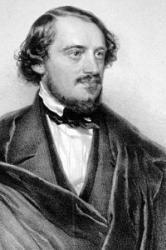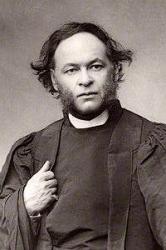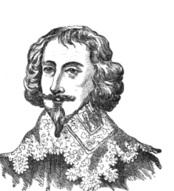
1799 - 1865 Person Name: Rev. Hugh Stowell Hymnal Number: 50 Author of "Lord of all power and might" in School and College Hymnal Stowell, Hugh, an able and popular minister of the Church of England, was born at Douglas, Isle of Man, December 3, 1799. He graduated at Oxford in 1822, and took holy orders the following year. He held various offices in his Church; became rector at Salford in 1831; was appointed honorary Canon of Chester Cathedral in 1845, and later Rural Dean of Eccles. He published several volumes. He also edited a book of hymns: A Selection of Psalms and Hymns Suited to the Services of the Church of England, 1831. To the several editions of this book most of his hymns were contributed. He died at Safford October 8, 1865.
From every stormy wind that blows 495
Lord of all power and might 206
Hymn Writers of the Church, 1915 by Charles Nutter
==================================
Stowell, Hugh, M.A., son of Hugh Stowell, Rector of Ballaugh, near Ramsey, was born at Douglas, Isle of Man, Dec. 3, 1799, and educated at St. Edmund Hull, Oxford, B.A. 1822; M.A. 1826. He was ordained in 1823, and held the curacy of Shepscombe, Gloucestershire; and then that of Holy Trinity, Huddersfield. Subsequently he was Curate in charge of St. Stephen's, Salford, and became rector of Christ Church, Salford, in 1831. In 1845 he was appointed Hon. Canon in Chester Cathedral; in 1851 Chaplain to the Bishop of Manchester; and Rural Dean of Eccles. He died at Salford, Oct. 8, 1865. His Memoir, by the Rev. J. B. Marsden, was published in 1868. Canon Stoweli was a popular and effective preacher. His publications included Tractarianism Tested, 1845; A Model for Men of Business, 1854 ; Pleasures of Religion and Other Poems, 1832; The Peaceful Valley, 1826 ; and a large number of single sermons, pamphlets, &c. His Selection of Psalms & Hymns was published as:—
A Selection of Psalms & Hymns Suited to the Services of the Church of England. By the Rev. H. Stowell, M.A., Manchester. Printed by Henry Smith, St. Ann's Square, 1831.
This Selection contained 233 hymns, in addition to versions of the Psalms. Of the hymns the following were by the compiler:—
1. Almighty Shepherd, Who didst give. (1828.) The Good Shepherd.
2. From every stormy wind that blows.
3. Gracious God, look down in kindness. Sunday School Anniversary.
4. Great God, we dare not bow the knee. Holy Communion.
5. Meek Lamb of God, on Thee. Lent.
6. To Thee, 0 God, we raise. Sunday School Anniversary.
7. Tune every heart, wake every tongue. Sunday School Anniversary.
8. When Jesus left the glorious sky. For an Infants’ School.
9. Yes, in the morning of our years. Sunday School Anniversary.
The 12th edition of this Selection published by Canon Stowell in 1864, was increased to 273 hymns, the additional hymns being in nearly every instance his own compositions. In addition to those already given we have:—
10. Again our yearly strain we raise. 1864.
11. Another year has glided past. (Before 1846.)
12. Another year with mercies strown. (Before 1846.)
13. Before Thy throne, 0 Lord, we bend. (Before 1846.)
14. By pressing dangers compassed round. 1843 (?).
15. Come, raise we all the blessed strain. 1862.
16. Hail, hallowed day of heavenly rest. 1844 (?).
17. Hark, how sweet those infant voices. 1841 (?).
18. How fruitless is the ploughman's toil. 1854.
19. How gently in night's silent hours. 1850.
20. Jesus is our Shepherd, Wiping, &c. 1849.
21. Jesus, Lord, Who hast ascended. 1853.
22. Jesus, Lord, we wait on Thee. 1863.
23. Jesus, our Saviour and our Lord. (Before 1846.)
24. Jesus, Prophet of Thy Church. 1861.
25. Lord, if our land be great and free. 1851.
26. Lord, in this dark and stormy day. 1848.
27. Lord, in Thy mercy hear our cry. 1855.
28. Meek Lamb of God, Who dost impart. 1859.
29. 0 God, the liquid sign of grace. 1856.
30. Sailing o'er life's changeful ocean. (Before 1846.)
31. Saviour, guide this little band. (Before 1846.)
32. The day of rest is passed away. (Before 1846.)
33. The morn of our lifetime is fast gliding by. (Before 1846.)
34. Though our lot be poor and lowly. 1847.
35. Thy cross, 0 Lord, the holy sign. 1840.
36. Wake, wake our yearly strain anew. 1852.
37. Wake, wake the joyful song. 1844.
38. We, a little simple throng. (Before 1846.)
39. We, little pilgrims of a day. 1845.
40. We love the holy house of prayer. 1857.
41. We will not weep as others do. 1842.
42. What is your life? It glances by. 1860.
43. What though our earthly lot be low. 1858.
These hymns were all written for the Anniversary Services of Christ Church Sunday Schools, Salford, and are included with others in a special Appendix in the 1877 ed. of the Selection as above.
Other hymns by Canon Stowell are:—
44. Children of old, Hosannah sang. Sunday Schools. 1830.
45. Lord of all power and might, Father of love, &c. Missions. Written for the Jubilee of the B. & F. Bible Society, March 7, 1853.
46. Shepherd of the ransomed sheep. The Good Shepherd.
47. Pilgrims in the narrow way. Sunday School Anniversary. This was his last hymn, and was written for the Christ Church Sunday School Anniversary, 1865.
Of Canon Stowell's hymns the most popular are Nos. 2, 3, 20 and 44. As a writer for children he was very successful. All the foregoing hymns are in the 15th ed. of his Selection edited by his son, Manchester, 1877; and in Hymns. By the late Rev. Canon Stowell, M.A. Manchester, 1868.
-- John Julian, Dictionary of Hymnology (1907)
Hugh Stowell




